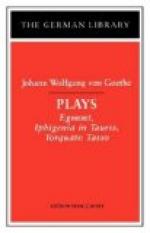Clara. Never mind! And then I think when he is with me I am never hungry; so he cannot, I should think, have any great appetite when I am with him.
Egmont. Do you think so? (Clara stamps with her foot and turns pettishly away.) What ails you?
Clara. How cold you are to-day! You have not yet offered me a kiss. Why do you keep your arms enveloped in your mantle, like a new-born babe? It becomes neither a soldier nor a lover to keep his arms muffled up.
Egmont. Sometimes, dearest, sometimes. When the soldier stands in ambush and would delude the foe, he collects his thoughts, gathers his mantle around him, and matures his plan and a lover—
Mother. Will you not take a seat, and make yourself comfortable? I must to the kitchen, Clara thinks of nothing when you are here. You must put up with what we have.
Egmont. Your good-will is the best seasoning.
[Exit Mother.
Clara. And what then is my love?
Egmont. Just what thou wilt.
Clara. Liken it to anything, if you have the heart.
Egmont. But first. (He flings aside his mantle, and appears arrayed in a magnificent dress.)
Clara. Oh heavens!
Egmont. Now my arms are free! (Embraces her.)
Clara. Don’t! You will spoil your dress. (She steps back.) How magnificent! I dare not touch you.
Egmont. Art thou satisfied? I promised to come once arrayed in Spanish fashion.
Clara. I had ceased to remind you of it; I thought you did not like it—ah, and the Golden Fleece!
Egmont. Thou seest it now.
Clara. And did the emperor really hang it round thy neck!
Egmont. He did, my child! And this chain and Order invest the wearer with the noblest privileges. On earth I acknowledge no judge over my actions, except the grand master of the Order, with the assembled chapter of knights.
Clara. Oh, thou mightest let the whole world sit in judgment over thee. The velvet is too splendid! and the braiding! and the embroidery! One knows not where to begin.
Egmont. There, look thy fill.
Clara. And the Golden Fleece! You told me its history, and said it is the symbol of everything great and precious, of everything that can be merited and won by diligence and toil. It is very precious—I may liken it to thy love;—even so I wear it next my heart;—and then—
Egmont. What wilt thou say?
Clara. And then again it is not like.
Egmont. How so?
Clara. I have not won it by diligence and toil, I have not deserved it.
Egmont. It is otherwise in love. Thou dost deserve it because thou hast not sought it—and, for the most part, those only obtain love who seek it not.
Clara. Is it from thine own experience that thou hast learned this? Didst thou make that proud remark in reference to thyself? Thou, whom all the people love?




